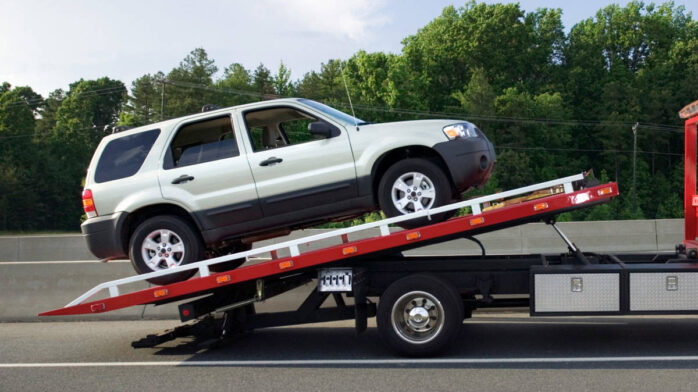A heavy load for towing is typically anything over 2,000 pounds. This weight can vary depending on the make and model of your vehicle, but generally speaking, anything over this amount can put a lot of strain on your tow truck. If you’re not sure if your load is considered heavy, ask your tow truck driver or look up the weight limits for your specific vehicle.
How to Tow a Heavy Load?

Heavy loads can be towed by using a towing vehicle with the appropriate configuration, weight rating and tire size. The tow vehicle must also have the capability to safely handle the load.
The most common way to tow a heavy load is with a truck camper. Truck campers are typically configured with a cargo area that can accommodate a heavy load. The camper’s suspension system can also handle the weight of the load.
Tractor-trailer combinations can also tow a heavy load. A tractor-trailer combination typically has more than one set of wheels and a heavier engine than a truck camper. The combination can be driven in low gear to minimize rpm and reduce power consumption.
This reduces fuel consumption and emissions.
What is Considered a Heavy Load for Towing?
A heavy load for towing is typically anything that requires more than a normal towing capacity. This includes things like large vehicles, trailers, and boats. It’s important to determine the weight of the items you’re towing before setting out, as this will help determine the maximum towing capacity you need.
Factors that Affect Towing Weight

When towing a vehicle, factors that can affect the weight of the vehicle include the size and weight of the trailer, the tow vehicle’s weight, and the terrain. It is important to understand how these factors affect towing weight so that you can choose the right combination of vehicles and trailers for your needs.
• The tow vehicle’s weight is particularly important because it affects both the amount of force required to tow and how much swaying or jolting will occur while towing. The heavier the tow vehicle, the more force it will require to pull the trailer. Additionally, very heavy trailers can cause a lot of vibration and shaking when towed, which can be uncomfortable for both you and your passengers.
• The size and weight of the trailer also play a role in towing weight. A small trailer that is lightweight may require less force than a large trailer that is heavy. However, a small lightweight trailer will likely be much more unstable when towed than a large heavyweight trailer. This instability can cause problems for both you and your passengers, so it is important to choose a trailer that is appropriate for your needs.
• Finally, terrain can also affect how much weight a trailer can carry. If you are towing over rough terrain, for example, the weight of the trailer will be affected by how much swaying or jolting occurs.
How to Reduce the Load on Your Towing Vehicle?
When towing a heavy load, it’s important to consider the weight of the vehicle and the tow vehicle. The following are general guidelines for reducing the load on your tow vehicle:
1. Use a properly fitted and rated towing vehicle. A heavy duty towing vehicle can handle more weight than a regular car or truck. Make sure the tow vehicle you select is compatible with the load you’re towing.
2. Use proper loading techniques. Load the heaviest object at the back of the tow vehicle, in the lowest section of the bed, and distribute the weight evenly across all four tires. Avoid overloading any one tire or section of the bed.
3. Use adequate braking and acceleration force. Braking and accelerating hard will cause more stress on your vehicle and could lead to brake problems or damage to your towed equipment. Use caution when braking and allow plenty of time for your system to cool before putting your towed item back on the road.
4. Monitor your driving conditions. Heavy loads can cause steering difficulties, decreased fuel economy, and increased emissions in hot weather conditions. If you experience any problems while towing, make sure to contact a professional truck tow truck service.
What Weighs More: The Vehicle or the Towing Equipment?

Weight is an important consideration when towing a vehicle. The weight of the vehicle and the weight of the towing equipment can affect the vehicle’s performance and handling. To determine which weight is more important, you need to consider both the vehicle’s weight and the towing capacity of the towing vehicle.
The maximum weight that a vehicle can weigh is determined by its class, make, and model. The classes are light, medium, and heavy. A light vehicle cannot weigh more than 4,500 pounds, a medium can weigh up to 7,500 pounds, and a heavy can weigh up to 10,000 pounds. The make and model also determine the tow rating for a vehicle. A tow rating is a measure of how much weight a towing vehicle can safely pull. Tow ratings for vehicles range from 1/4 ton (1,800 pounds) for a car to 6 ton (12,000 pounds) for a truck.
The weight of the towing equipment is also important. Towing a boat or a trailer with a weight that exceeds the towing capacity of the vehicle can damage the vehicle or the equipment. To avoid this, you should check the towing capacity of the towing vehicle and the weight of the load before towing.
Conclusion
There is no one answer to this question, as it depends on a number of factors, including the weight of your vehicle and the type of towing you are doing. However, a good rule of thumb is to think about how much weight your vehicle can handle before you tow anything. If you are not sure whether or not your vehicle can handle the load, talk to a tow truck professional or consult with the manufacturer’s specifications.


